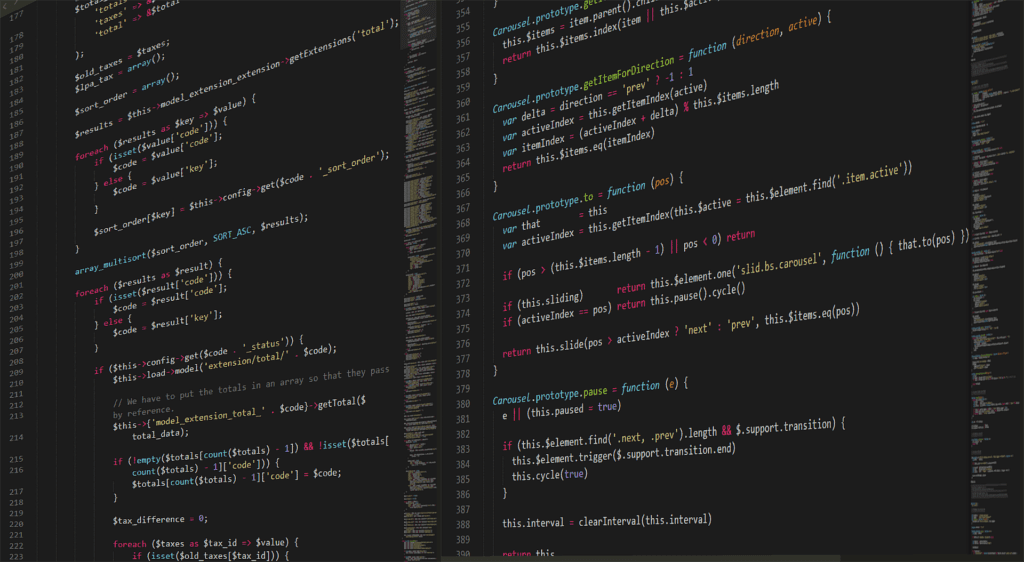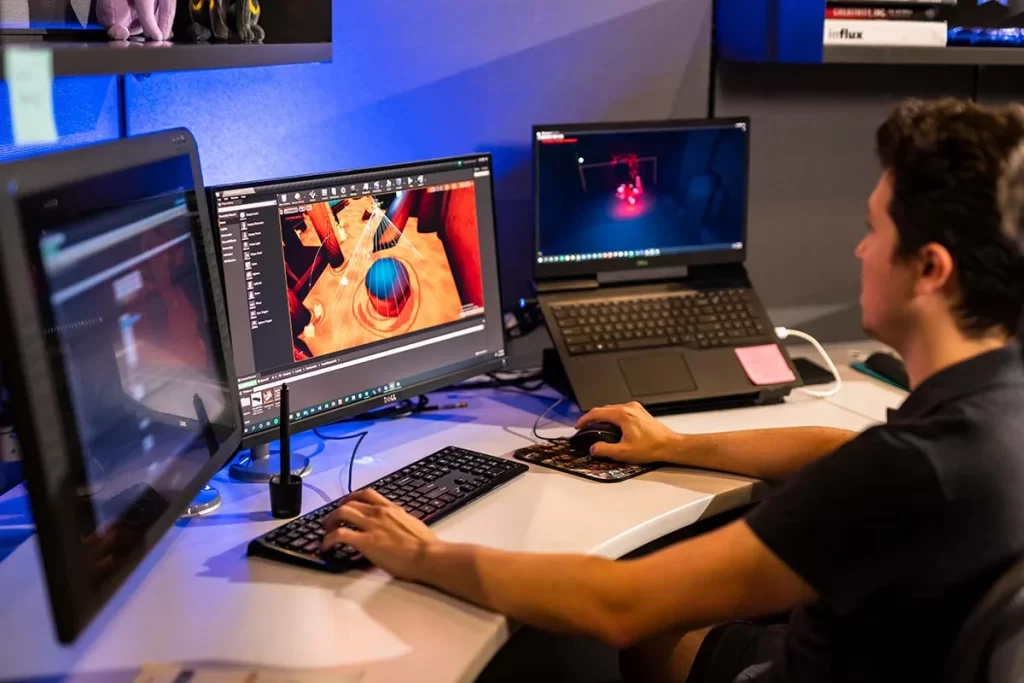The gaming industry is one of the widest-reaching niches of the entertainment industry. Its sphere of influence is so big it’s set to generate over $365 billion in revenue over 2023 – which averages to at least a billion every 24 hours.
This field hinges on three main pillars of game development: design, art, and coding (or programming), serving as the backbone of every game we know and love. In this article, we’ll explain what is a game coder, its main responsibilities, and the many paths you can take to work in this evergreen industry.
What is a game coder?
Unsurprisingly, a game coder is the mastermind behind the technical implementation of a game. They work alongside fellow designers (who envision the game mechanics and generate ideas for the game) and artists (who create hundreds, if not thousands of assets used in-game) to implement their work into a cohesive, unified experience – the game.
Imagine, for instance, a game where you take on the role of a space explorer drifting through asteroid fields, descending to planets to collect water and minerals, and scavenging derelict spaceships for vital resources.

From the controls of your spacecraft and the combat system to the logic that dictates which resources will be available on each planet, everything is implemented by these game coders, who leverage their extensive knowledge of programming languages, game engines, and other development tools to bring these worlds to life.
However, their grasp reaches much further!
What are the main responsibilities of a game coder?
While mainly associated with the technical amalgamation of a game design and its assets, game coders actually do much more beneath the hood.
Other than programming the game mechanics, character movement, and loot generation mechanisms, game coders are responsible for the implementation of user interface elements, environmental interactions, graphics, rendering mechanisms, and physics.
Most of these features are more or less baked into game engines, the integral piece of software in game development, only requiring some tweaks to work as intended. However, for some more complicated projects, game coders often have to thwart the rules to create something unique.
Speaking of rendering and physics, they’re computationally expensive processes. In other words, they might cause performance issues in rigs with older hardware and previous console generations. Game coders also take on optimizing the game’s technical aspects to ensure a smooth gameplay experience for as many players as possible, a critical task in the gaming industry.
Not even the best and brightest programmers around the world can weave complex code and game mechanics with no slip-ups. Coders often serve as the first line of defense against bugs, glitches, and unintended exploits – after all, they’re the ones cranking thousands of lines of code a day.
As prototypes and vertical slices are created and tested by the public or quality assurance (QA) personnel, game coders can expect a seemingly endless stream of bug reports, which may or may not be fully documented with reproduction steps to make this process faster.
The situation can quickly spiral out of control, especially in projects with no pre-established standards or poorly documented code base, as fixing a bug might spawn a handful of new ones. It might feel like you’re rolling a stone up the hill – and it might get desperate – but there’s always a way out: coordinated effort and time, even if many files have to be written from scratch.
In games devised to have multiplayer aspects, game coders are responsible for handling all of their networking aspects, which can include synchronization with a database, server management, and player matchmaking. Nailing these features is especially important for games where reaction time is critical to the gameplay, like fighting games, shooters, and MOBAs.

Nowadays, multiplatform game releases are commonplace, and game coders also work on adapting and optimizing the game’s code to ensure it runs smoothly on all targeted platforms. By the way, this process is called “cross-platform development” if it happens prior to a game’s release and “game porting” otherwise.
Scripting is another essential element of games, as they’re an easy and convenient way to create in-game events, dialogues, and cutscenes, and add small functionalities to game assets. Adding this feature when it matters can add lots of depth to the game’s storytelling, which might drive player engagement up.
Recently, developments in the artificial intelligence (AI) and machine learning (ML) fields have been stealing spotlights everywhere. As it stands, both are mainly used to add lifelike behavior to non-playable characters (NPCs), decision-making processes, and procedural generation algorithms.
However, game coders can leverage cutting-edge developments to add many features that can significantly make a game more immersive. For example, AI NPC agents running on GPT-4 or a custom large language model (LLM) can be coupled with a speech synthesis algorithm to generate new dialogue on the spot.
Yes – it’s in Skyrim, of course.
Finally, game coders are responsible for using version control systems to track changes in the project’s code. They’re also required to thoroughly document whatever they write, as it helps fellow programmers understand exactly what each function or complex line of code does, like the infamous fast inverse square root snippet used in Quake.
What about the salary of a game coder?
As usual, the salary can vary a lot depending on a variety of factors. In cities with higher living costs, like London, anywhere in Silicon Valley, or any other sprawling urban jungle, you can expect wages to be comparatively higher. Working for bigger companies, how many years of experience you have, your previous projects, your certifications, and other factors can significantly impact your monthly salary.
It should also not be a surprise that different sources on the internet will say different things – after all, their data is community-sourced, so there will be differences here and there. Having said that, the current yearly compensation for American game coders stands at a whopping $94k a year (or around $45.20 an hour) according to Zippia, with entry-level professionals receiving on average $65k a year.
Comparably, on the other hand, tells a slightly different story: the average American game coder makes around $118k a year, with those in senior positions being able to rack up over $550k a year and those who just got into the industry making around $22k as a part-time employee.
First steps into game coding: how to get started?
Becoming a game coder requires you to go on a long, but rewarding journey, and you don’t need to be a programming prodigy to start. Here are some effective ways to kickstart your career in game development:
Guided projects: perfect for small projects
If you’re just getting started, guided projects and video tutorials (like those found on YouTube for simpler games, such as Snake, Pong, Tic-Tac-Toe, and other tiny projects) offer a somewhat structured and in-depth way to learn about programming concepts, like handling conditions, loops, manipulating variables and arrays, and more. You’ll also get some practice with important concepts in game development – collisions, events and triggers, animations, etc.
You can even find some official tutorials on Unity, which offer step-by-step guides on many aspects of game development. They are an interesting option for beginners as these tutorials often have a lot of hand-holding to ensure the students grasp the fundamental concepts.

Online courses: the middle term
For those looking for longer-term education options, but not as long or as expensive as college tuition, numerous online courses are catering to aspiring game programmers. Learning platforms like Coursera, edX, Skillshare, and Udemy offer a variety of courses ranging from complete beginner to advanced levels.
Generally speaking, look for courses that focus on game coding with popular engines like Unity, Unreal, and Godot, the current trifecta of free (for the most part) and powerful frameworks for building your games.
Other than the knowledge acquired and the possibility of networking with other people, many of these courses offer certificates, which might be valuable when seeking employment in the industry – and it goes well with an organized portfolio showcasing your best creations.
College degrees: comprehensive, but demands time (and money)
If you decide to pursue a degree, consider programs that offer game development or interactive media specializations. These programs often include coursework in or very related to game development, including design, graphics, coding, and how to leverage AI in games, preparing you for a career in game programming.

Speaking of a degree, many believe that having one is a hard requirement to work in IT. While some employers require degrees, especially for roles with high levels of responsibility, the game development industry values practical skills, creativity, a strong portfolio, and excellent teamwork skills. Having said that, a computer science or game development degree can provide a solid foundation and make you stand out from other competitors, so always keep it in mind.
Game jams: chaotic, but always a delight
Game jams are one of the best ways to practice and apply your hard-earned knowledge. They are events where game developers (including programmers, artists, designers, writers, music producers, and even aspiring hobbyists) come together to create games following a theme in a short amount of time, often a weekend.
Participating in game jams exposes you to the entire game development process, from brainstorming ideas and creating prototypes to actually coding the game and making its assets. It’s an amazingly chaotic way to get some hands-on experience and collaborate with others in the gaming community. And you don’t have to be an expert either as many participating in these events are hobbyists and newcomers – all it takes is some willingness to learn.
Platforms like Ludum Dare and Global Game Jam host regular game jams, but there are many ongoing ones at any moment. You can check them out on Itch.io’s comprehensive game jam calendar.
Conclusion
As seen throughout the article, game coders are the technical masterminds behind the game’s implementation; uniting the game designers’ vision with the artists’ eye-catching assets into a single product – the game itself.
Beyond cranking line after line of code, game coders are also responsible for optimizing performance, fixing bugs, implementing multiplayer features, adapting it to multiple platforms, and even leveraging AI features to create a magnificent user experience.
By the way, are you looking for proficient game coders to assist in the development of your game? We are Main Leaf, a leading indie development studio specializing in all things game development.
Whether you need some assistance with game art, or blockchains, or want a complete game development solution tailored for you, our 70+ talented professionals will be ready to lend you a helping hand. Our experience in the gaming industry spans over a decade, and we can make your wildest dreams come true.
To get started with Main Leaf, shoot us a message below and you’ll hear from us within 24 hours.

